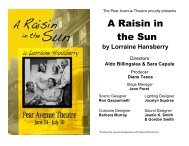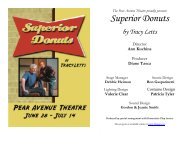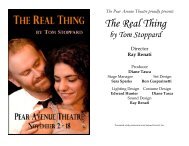The Glass Menagerie - Mountain View - The Pear Avenue Theatre
The Glass Menagerie - Mountain View - The Pear Avenue Theatre
The Glass Menagerie - Mountain View - The Pear Avenue Theatre
Create successful ePaper yourself
Turn your PDF publications into a flip-book with our unique Google optimized e-Paper software.
DIRECTOR’S NOTE<br />
he did own one essential part of a hero,<br />
<strong>The</strong> idea of life as a nothing-withholding submission of self to flame.<br />
– from the poem “Part of a Hero” by<br />
Tennessee Williams<br />
This play is memory, and like all memories it’s a fabrication, a rainbow<br />
refracted through a piece of glass. It is an exorcism of Williams’ guilt<br />
over abandoning his sister Rose, an exploration of his complicated<br />
relationship with the mother who both supported and smothered him,<br />
and a fantasy of banishing the father who disapproved of him. Just as<br />
Tennessee Williams was a public persona created by Tom Williams to<br />
mask the shy, fragile poet within, Tom Wingfield is not Tennessee. He is<br />
an invented stand-in, someone who can say the things Tennessee perhaps<br />
wished he could have said.<br />
Like Tennessee, and like all of us, the characters in this play survive with<br />
the help of inventions and illusions. Amanda chooses to live in the past,<br />
clinging to her illusions of the way she wishes things could be. Tom,<br />
suffocated by his mother and stifled by his job, tries to find meaning in<br />
stories on the silver screen. Laura takes more comfort from the imagined<br />
lives of inanimate objects than from human interaction. Jim both thrives<br />
on his past glory and re-invents himself through words.<br />
We make our memories into stories to help us feel better about<br />
ourselves, to explain the pattern of our lives, to make others love us.<br />
Williams requires us to examine our own stories and submit our darkest<br />
corners to the flame of candlelight. To live most fully, he seems to say<br />
throughout his plays and poems, we must rip off the veil of illusion and<br />
embrace our full natures - the transcendent and the base, the noble and<br />
the selfish, the triumphs and the regrets.<br />
--Rebecca J. Ennals<br />
Throughout this process, we have taken inspiration from Williams’<br />
poetry. You’ll find some of our favorites in the lobby.<br />
ABOUT THE PLAY AND THE PLAYWRIGHT<br />
Thomas Lanier Williams III was born in 1911 in Mississippi, grew up<br />
mostly in Missouri, and graduated from the University of Iowa. But he<br />
loved Tennessee, probably because he had spent happy times in<br />
Memphis with his maternal grandparents. In any case, he took the name<br />
“Tennessee” early in his career. His father, a hard drinker who worked<br />
for the International Shoe Company in St. Louis, did not find young<br />
Tom masculine enough for his taste; he preferred Dakin, Tom’s much<br />
younger brother. Williams’ mother, Edwina, struggled in her unhappy<br />
marriage, and his beloved older sister, Rose, became withdrawn and<br />
unstable in early adulthood. Eventually her parents consented to have her<br />
lobotomized, after which she was institutionalized.<br />
A long recovery from diphtheria in childhood gave Williams a<br />
love of reading; a performance of Ibsen’s Ghosts in 1934 showed him the<br />
power of drama; D. H. Lawrence’s fiction was a strong early influence.<br />
<strong>The</strong> <strong>Glass</strong> <strong>Menagerie</strong> (1945) was Williams’ first major success, followed<br />
notably by A Streetcar Named Desire (1947), <strong>The</strong> Rose Tattoo (1951), Cat on a<br />
Hot Tin Roof (1955), Suddenly Last Summer (1958), <strong>The</strong> Night of the Iguana<br />
(1961), and Eccentricities of a Nightingale (1964). Besides over two dozen<br />
full-length plays, Williams wrote many short plays, two novels, short<br />
stories, poetry, and memoirs and is widely regarded as one of the<br />
twentieth century’s most gifted playwrights.<br />
Despite this professional success and acclaim, Williams’ personal<br />
life was not happy. He was gay but did not come out of the closet until<br />
1970. He had a 15-year-long stable relationship with Frank Merlo, but<br />
even during that time, he was given to numerous sexual encounters with<br />
unknown men. Nevertheless, he was devastated by Merlo’s relatively<br />
early death in 1963. Williams became dependent on drugs and alcohol,<br />
and his habits were often erratic. He died in 1983 after choking on a<br />
bottle cap which he may have been using as cup to help him swallow<br />
pills.<br />
Writing was Williams’ lifeline. He wrote nearly every day of his adult<br />
life. <strong>The</strong> <strong>Glass</strong> <strong>Menagerie</strong>, based on several early short stories, was his first<br />
success, produced when he was in his early 30s. It nearly closed as soon<br />
as it opened in try-outs in Chicago, but it was saved by two women. One<br />
was Laurette Taylor, who played Amanda Wingfield; she was a former<br />
Broadway star who had spent the previous twenty years in a bottle. In<br />
rehearsal, Taylor seemed unable to learn Amanda’s lines. But at the











